Civil Liberties, Criminalizing Dissent, Human Rights, Political Prisoner, Surveillance, Truth to Power, War Resister
Podcast: Play in new window | Download
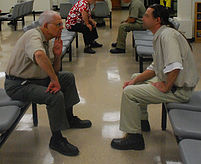
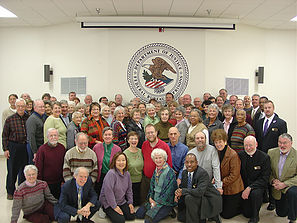
Prison Visitation and Support
In hundreds of correctional facilities across the nation, in person visits are being phased out. Instead, video technology run by Securus and other companies is used to replace these visits. One researcher at the Prison Policy Initiative has pieced together hard to gather stats that suggest at least 600 US prisons have video visitation programs in place. In Florida, for example, on retired prison inspector who writes about video visitation, says that over the past five years, most jails there are using only video visitation and have altogether stopped in-person visitation.
The Prison Policy Initiative’s data suggests that 74% of US correctional facilities that implement video calling end up either reducing in-person visits, or totally eliminating them. Is the elimination of prison visits a human rights violation? Most prisoners receive few, if any visitors, or human contact.
Guest – Steve Gotzler, executive director of the Prison Visitation and Support. Steve is the former program director at the Pennsylvania Prison Society, and he knows firsthand what it’s like to spend time in federal prison.
—-

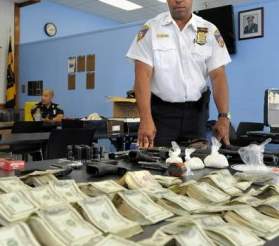
Supreme Court Rules On Civil Forfeiture
In a unanimous decision, the U.S. Supreme Court recently ruled that the Constitution limits the ability of state and local law enforcement to seize and then use cash, property, and other assets that may have been used the commission of crimes, especially when used to fill the coffers of police departments. Law enforcement need only suspect the property has been used as a crime; they don’t need to charge you.
Ruth Bader Ginsburg wrote the opinion on her first day back at the court. Civil liberties organizations have criticized this practice for years. That’s because many local governments use these fines to raise revenue, increasing incentives for arrests.
Not surprisingly, civil asset forfeiture disproportionately affects vulnerable communities, notably African Americans and lower-income neighborhoods. In the state of South Carolina, for example, The Greenville News reported that the state took $17 million from seizures from 2014 to 2016. Sixty-five percent of those targeted were African American. The high Court said that fines may not be excessive, and that states are currently using excessive fines for improper purposes, including for raising revenue.
Guest – Josie Duffy Rice is a lawyer and writer in New York. Josie is a former research director with the Fair Punishment Project.
Civil Liberties, Human Rights, NSA Spying, Political Prisoner, Surveillance, Truth to Power, War Resister
Podcast: Play in new window | Download
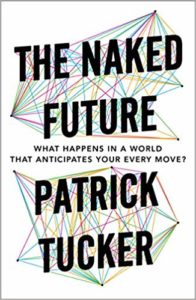

Cyber Threats And US Cyber Security
Russian hackers need only 19 minutes after breaking into a computer to wreak greater destruction and data theft, according to a recent CrowdStrike report. The Kremlin beat out North Korean and Chinese hacker groups who needed two and four hours respectively to go from breaching one computer to another. Cyber threats from Russia are sophisticated and aggressive, according to earlier findings and many experts. As a results Russian saboteurs have moved beyond network intrusion into data manipulation and taking down power systems.
Guest – Patrick Tucker, technology editor for Defense One. Patrick is the author of the 2014 book, The Naked Future: What Happens in a World That Anticipates Your Every Move? Previously, Tucker was deputy editor for The Futurist. He has written widely about emerging technology for such publications as Slate, MIT Technology Review, and BBC News Magazine.
—-


10 Years Since Operation Cast Lead
Last month marked the 10 year anniversary of Israel’s illegal massive deadly attack on the Palestinian people living in the open air prison of the Gaza Strip along the Mediterranean sea in the south of Israel-Palestine.
The attack was carried out with the political and military support of the George W. Bush regime during its final few days. Some 1200 Palestinians were killed including 500 children. This has been documented in the United Nation’s sponsored Goldstone Report.
Israel’s continuing illegal settlement of Palestinian land and it’s dispossession of Palestinian people is made possible by American political, military, and economic support. But this support is coming under increasing challenge with Israel’s violation of human rights and of international law being more widely exposed and discussed.
Guest – Helena Cobban is the publisher of Just World Books and is active through her new not-for-profit organization Just World Educational. She works in broad community education campaigns on matters of war, peace, and justice in the Middle East.
——————-

——————-
CIA Sponsored Terror, Civil Liberties, Criminalizing Dissent, Human Rights, Political Prisoner, Prison Industry, Supreme Court, Surveillance, Targeting Muslims, Torture, Truth to Power, War Resister
Podcast: Play in new window | Download

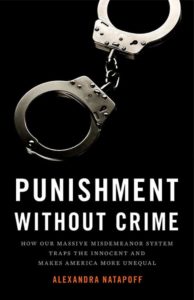
Punishment Without Crime: How Our Massive Misdemeanor System Traps the Innocent and Makes America More Unequal
In the overburdened U.S. criminal justice system, with its burgeoning prison population, we hear a lot about felony convictions. Felonies are crimes usually punishable by a term of more than one year, or the death penalty. What we don’t hear much about are misdemeanors, low level offenses punishable by fines or short terms of imprisonment in local jails.
With ten million petty cases filed annually, most U.S. convictions are misdemeanors. Unlike felonies, however, their processing is typically informal and deregulated. Much like fast-food justice, they have high-volume arrests, weak prosecutorial screening, an overtaxed defense bar, and high plea rates. There is often little meaningful scrutiny to see if convictions are supported by evidence. Innocent people who can’t afford bail often plead guilty just to get out of jail.
What the result of misdemeanor convictions? It’s pretty serious: stigma of a criminal record, misdemeanants are often heavily fined, incarcerated, and/or lose jobs, housing, and educational opportunities. Petty convictions are more frequent and burdensome even as we devote fewer institutional resources to ensuring their validity.
The misdemeanor phenomenon has profound systemic implications. It invites skepticism about whether thousands of individual misdemeanants are actually guilty. It reveals an important structural feature of the criminal system: that due process and rule-of-law wane at the bottom of the penal pyramid where offenses are pettiest and defendants are poorest. Misdemeanor processing is the way poor defendants of color are swept up into the criminal system with little or no regard for actual guilt.
In her new book, Punishment Without Crime: How Our Massive Misdemeanor System Traps the Innocent and Makes America More Unequal, Law Professor Alexandra Natapoff takes an in-depth look at the misdemeanor process is an institutional gateway that explains many of the criminal system’s dynamics and dysfunctions.
Guest – Alexandra Napatoff, University of California Irvine law professor and a member of the American Law Institute. She’s also a former federal public defender, a community organizer, and the recipient of an Open Society Institute Community Fellowship.
—-
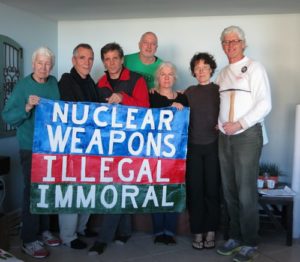
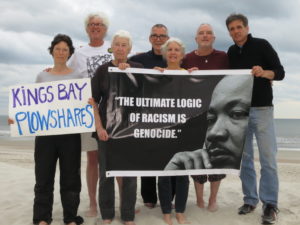
Kings Bay Plowshares 7
In our society nuclear weapons that can destroy all creation are taken as a normal, even an inevitable, part of life. In a dramatic action to break what they call “the crime of silence“ seven Catholic peace activists entered the Kings Bay trident submarine base in Georgia last April to perform an act of symbolic disarmament.
They used hammers to follow the prophecy of Isaiah “to beat swords into plowshares” and poured blood to make holy what was evil in a sacramental action.
Kings Bay is homeport to six ballistic missile trident submarines, each of which deploy 16 trident missile’s carrying four or more warheads of at least 100 kilotons. The Hiroshima bomb was 14 kilotons. Each submarine thus has the distructive power of at least 500 Hiroshima bombs.
The plowshares seven face up to 25 years in federal prison. Their trial is coming up in the next month. Theirs was the latest of 100 plowshares actions around the world since 1980.
Guest – Martha Hennessey, Kings Bay Plowshares 7 co-defendant, activist and volunteer with the New York Catholic Worker.
Guest – Carmen Trotta, Kings Bay Plowshares 7 co-defendant, activist and volunteer with the New York Catholic Worker.
——————

——————
CIA Sponsored Terror, Civil Liberties, Criminalizing Dissent, FBI Intrusion, Human Rights, Political Prisoner, Prison Industry, Supreme Court, Surveillance, Truth to Power, War Resister
Podcast: Play in new window | Download
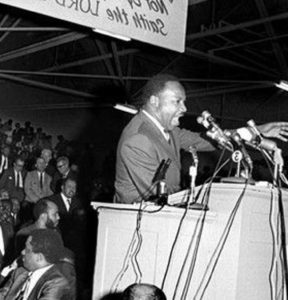
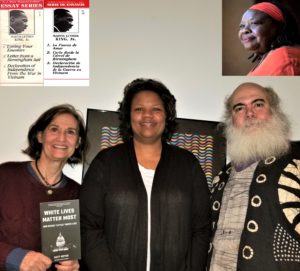
Honoring the Legacy Of Dr. Martin Luther King Jr.
Today on Law and Disorder we bring you a special hour-long program honoring the life and legacy of the Rev. Dr. Martin Luther King. Our listeners know all too well that the Nobel Peace Prize laureate was shot on April 4, 1968–51 years ago. Not so well known is the radical Dr. King, who said in the last months of his life that:
“Our only hope today lies in our ability to recapture the revolutionary spirit and go out into a sometimes hostile world, declaring eternal hostility to poverty, racism, and militarism. With this powerful commitment we shall boldly challenge the status quo.”
Joining us are special guests Ruby Sales, a colleague of Dr. King’s and co-founder of the Student Nonviolent Coordinating Committee; and Rev. Dr. Emma Jordan-Simpson, Executive Director of the Fellowship of Reconciliation (F.O.R.). We’re also joined by author and activist Matt Meyer, a board member of the AJMI.
Dr. King began close ties with A.J. Muste and with the F.O.R. during the Montgomery bus boycott, when FOR staff members Bayard Rustin and Glenn Smiley came to Alabama to support local efforts nonviolently challenging racial segregation. Dr. King developed a special relationship with former FOR chairman A.J. Muste, whose absolute pacifism King had, as a theological seminary student, questioned.
Before heading F.O.R., Muste was a prominent labor leader, helping to found the militant Congress of Industrial Organizations (CIO). And Dr. King, of course, was killed exactly one year after taking a staunch anti-Vietnam war position and in the midst of supporting a significant strike of sanitation workers, linking—as he had been—issues of race, class, and violence as King deepened his critique of the roots of oppressive U.S. society.
Guest – Ruby Sales is the founder and director of the “SpiritHouse Project”, a national organization that uses the arts, research, education, action and spirituality to bring diverse peoples together to work for racial, economic and social justice as well as for spiritual maturity. A life-long organizer, scholar and public theologian in the areas of civil, gender and other human rights, she was a member of the Student Non-violent Coordinating Committee and served as national convener of the Make Every Church A Peace Church movement.
Guest – Rev. Dr. Emma Jordan-Simpson is the Executive Pastor of The Concord Baptist Church of Christ, Brooklyn, NY. She has combined pastoral ministry with the social justice community. The former Executive Director of the Children’s Defense Fund she is now the Executive Director of the Fellowship of Reconciliation.
Guest – Matt Meyer is Secretary-General of the International Peace Research Association, Chair of the International Fellowship of Reconciliation’s Financial Advisory Committee, Africa Support Network Coordinator of the War Resisters International, and Senior Research Scholar at U-Mass Amherst. As current National co-chair of FOR and former Chair of the War Resisters League, he is second only to AJ Muste in holding the top post of those two historic US peace organizations. He is author of the recently published White Lives Matter Most And Other “Little” White Lies.
———-

———-
Civil Liberties, Death Penalty, Human Rights, Political Prisoner, Supreme Court, Truth to Power, War Resister
Podcast: Play in new window | Download
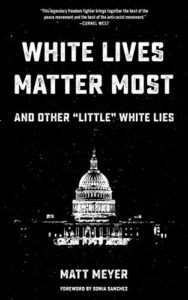
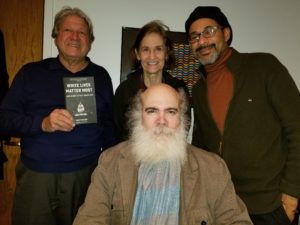
White Lives Matter Most And Other “Little” White Lies
In a society in which entrenched racism persists, is it possible for white activists to meaningfully engage in anti-racist movements such as the movement for black lives?
Longtime peace activist, educator and author Matt Meyer examines that question in his new book White Lives Matter Most And Other “Little” White Lies. As we honor the life and legacy of Reverend Dr. Martin Luther King Jr. we talk with Matt Meyer of whom Cornell West says “this legendary freedom fighter brings together the best of the peace movement and the best of the anti-racism movement. “
Guest – Matt Meyer is the International Peace Research Association representative at the United Nations, the national co-chair of the Fellowship of Reconciliation, and the War Resisters’ International Africa Support Network Coordinator. A noted educator, author, and organizer, Meyer focuses on an extensive range of human rights issues including support for political prisoners; solidarity with Puerto Rico, the Black Liberation movement and all decolonization movements; and bringing an end to patriarchy, militarism, and imperialism.
—-
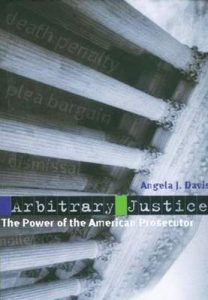
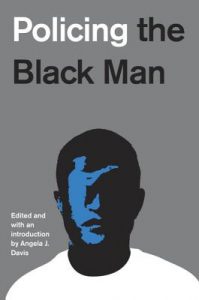
Attorney Angela Davis: Arbitrary Justice
“In the halls of justice”, it has been quipped, “the only justice you find is in the halls.” H. Rap Brown, a leader of SNCC, the Student Non-violent Coordinating Committee, said that justice in America means “just us”. There are 2.3 million people in American prisons today. A great proportion of them are African-Americans. If you assume Europe has the same social situation that we do in America, it is a telling fact that we have seven times as many prisoners. Part of the explanation for this phenomenon, In addition to the racist nature of the United States of America, is the power that the American prosecutor has. It is the power to choose whom to prosecute and for what crime. It is the power to obtain convictions, not to seek justice. It is a power that is discretionary and open to abuse. This abuse is rarely reviewable or punished.
Guest – Attorney and Professor Angela J. Davis author of Arbitrary Justice: The Power of the American Prosecutor. Her most recent book “Policing the Black Man” covers the key issues of the Black Lives Matter movement. Angela J. Davis, professor of law at American University Washington College of Law, is an expert in criminal law and procedure with a specific focus on prosecutorial power and racism in the criminal justice system. Davis previously served as director of the D.C. Public Defender Service, where she began as a staff attorney representing indigent juveniles and adults. She also served as executive director of the National Rainbow Coalition and is a former law clerk of the Honorable Theodore R. Newman, the former Chief Judge of the D.C. Court of Appeals. Davis is the author of Arbitrary Justice: The Power of the American Prosecutor
———

———
CIA Sponsored Terror, Civil Liberties, Crony Capitalism, Habeas Corpus, Supreme Court, Surveillance, Truth to Power, War Resister
Podcast: Play in new window | Download
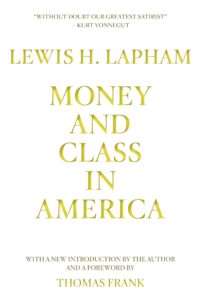
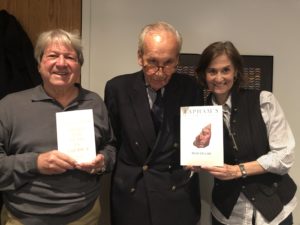
Money And Class In America – Lewis Lapham
We are especially pleased and honored to spend the hour with our guest Lewis Lapham. After graduating from Yale in 1956 he started out working as a newspaper reporter in San Francisco and then in New York, where he currently lives and works. The editor of Harper’s Magazine for 20 years, Lapham has written 14 books. Currently, he edits “Lapham’s Quarterly.”
Lapham founded the quarterly magazine in an effort to further the consideration of history, which he calls “the advice and counsel of the past.” He sees history as “a guide to understanding and acting on the issues and ideas before us today.”
Major pillars of the rule of law have been defiled since 911. The edifice still stands, the promises remain, but as a nation, we have suffered huge losses. Last spring Lapham’s Quarterly addressed the topic, “The Rule of Law.” His 1988 book “Money and Class In America” was re-published by OR Books last year with a new introduction by Lapham and a forward by Thomas Frank. We speak with him in our studio today about the contradiction between the rule of the monied rich and the rule of law.
Guest – Lewis Lapham is editor and founder of Lapham’s Quarterlysince 2007 and editor of Harper’s Magazinefrom 1975 to 2006, Lewis H. Lapham is a member of the American Society of Magazine Editors Hall of Fame. He is the author of fourteen books, among them Money and Class in America, The Wish for Kings,Waiting for the Barbarians, Theater of War, and Age of Folly. He produced a weekly podcast,The World in Time, for Bloomberg News from 2011 through 2013. His documentary filmThe American Ruling Class has become part of the curriculum in many of the nation’s schools and colleges. A member of the Council on Foreign Relations in New York, Lapham has lectured at Yale, Princeton, Dartmouth, Stanford, the University of Michigan, and the University of Minnesota.




















